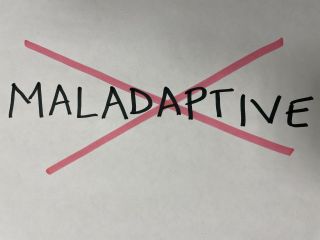Therapy
Words That Judge and Words That Heal
Rethinking the vocabulary used in therapy settings.
Posted February 10, 2023 Reviewed by Davia Sills
Key points
- Many of the words therapists use are judgmental.
- It's important to constantly rethink our therapy vocabulary.
- Our aim is to use words that heal, rather than judge.
In 2018, I wrote a blog post called "Maladaptive Character Patterns: The Stuff of Survival." In it, I argued that rather than talking about "personality disorders," we should talk about "maladaptive patterns." We all develop patterns, I wrote, in order to survive. So how can we call some of them disorders?

At the time, that seemed like a good revision. But now, when I read the word "maladaptive," I cringe. In English, the prefix "mal" means bad. If we call one coping strategy maladaptive and another adaptive, it's as good as saying that one is bad and another is good. The very use of the term is judgmental. And if all patterns are developed to ensure survival, aren't they all adaptive?
I've used many terms over the years that I now see as judgmental. Consider the word "healthy." I've used it to modify so many things—healthy defenses, healthy relationships, and a healthy sense of self. In the past, it made so much sense to me, but now it doesn't. What does it mean to be healthy? Healthy according to whose scale?
Different groups see different patterns as healthy. For example, one group might think that monogamous relationships are healthy, while another might not use that parameter as an indication of health. What seemed like a useful word blatantly implies judgment. And we're not even talking about terms like
"primitive," which is socio-culturally insulting, or "infantile," which demeans adults who developed survival tactics for important reasons.
As therapists, words are our primary tools.
We use them to convey empathy, understanding, and interest. We use them collaboratively in therapy to give shape to life experiences and to help create new narratives. So we must use our words wisely. This is not about being politically correct; it's about rethinking how we conceptualize and communicate in ways that recognize diversity and avoid judgment. How can we think about differences among patterns without judgment? How can we use words that help us to understand and communicate without consciously or unconsciously judging?
I don't claim to have all the answers, but as an example, I'll share how I have grappled with the concept I began this post with—maladaptive patterns. As mentioned above, I initially thought this was a much less judgmental term than "personality disorder." But as I began to understand the way that it implied judgment, I tried to think about what I was trying to convey rather than trying to sort people according to categories.
People come to therapists because they are having some kind of trouble. They might feel bad about themselves, their relationships, or the way they adapt to stress. Our job is to help them, not to label them. We want to learn about their patterns and help them to use strategies that optimize their life experience. Some strategies may do that more effectively than others, and the strategies that work well for one person may work less well for another and vice versa. Rather than sorting those strategies by whether I see them as adaptive or maladaptive—or even "more or less adaptive"—starting from a place that assumes that all strategies are adaptive at some point in life seems right to me. So, I began to think that the question wasn't about the absolute value of the strategy but rather about the cost-benefit ratio of that strategy for that person at that particular point in time.
As an illustration, let's consider Felix*. Beaten by his father, Felix began dissociating as a child. While he was being hit, and at other moments, he lost track of time and place, often rocking or sitting in a corner with his eyes closed. Once he left his home, he did this less and less, but it continued during moments of stress.
Now a father himself, Felix feels that he disconnects from his family—particularly at moments of interpersonal turmoil. He comes to his first session after his partner tells him that his pattern of "checking out" during conflicts with their teenage son leaves her feeling "alone and hopeless." According to many books about coping strategies, Felix's continued tendency to dissociate would be labeled as maladaptive. But if we think about the cost-benefit ratio of his dissociation, we can say that as a child, the cost-benefit ratio was low—this strategy was high-benefit, as it helped him to survive an abusive relationship, and low-cost—and that this ratio has shifted to being high-cost and low-benefit later in life.
This way of thinking about Felix's strategies helps him to gauge the cost-benefit ratio himself rather than diagnosing his survival mechanism as a pathology. It helps us to communicate clearly about the function of the pattern rather than judging it, and it helps us to work together to shift his cost-benefit ratio to a place where he can get more out of life.
Perhaps, in five years, I'll look back on this blog and rethink this conceptualization. I hope so. Challenging myself to constantly re-work the language I use to think about the people with whom I work in therapy and to communicate with them has been both intensely meaningful and useful for myself, my students, and the people with whom I work. I hope that we can all work together to constantly create fewer words that judge and more words that heal.
*not an actual patient




